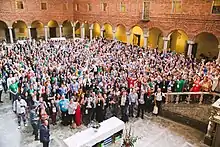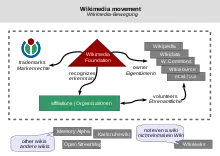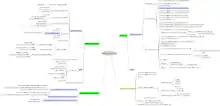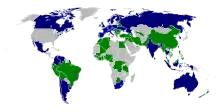Wikimedia movement
The Wikimedia movement, or simply Wikimedia, is the global community of contributors to Wikimedia Foundation projects. The movement was created around Wikipedia's community, and has since expanded to the other Wikimedia projects, including the commons projects Wikimedia Commons and Wikidata, and volunteer software engineers and developers contributing to MediaWiki. These volunteers are supported by numerous organizations around the world, including the Wikimedia Foundation, related chapters, thematic organizations, and user groups.
 | |
 Wikimania 2019 group photograph | |
| Type | Informal organization of individual contributors, chapters, user groups and thematic organizations |
|---|---|
| Focus | Free, open-content, wiki-based Internet projects |
Area served | Worldwide |
| Services | Authoring and editing Wikipedia, Wiktionary, Wikimedia Commons, Wikidata, Wikiquote, Wikibooks, Wikisource, Wikispecies, Wikinews, Wikiversity, and Wikivoyage Developing MediaWiki software |
| Website | wikimedia |
The name "Wikimedia", a compound of wiki and media, was coined by American author Sheldon Rampton in a post to the English mailing list in March 2003,[1] three months after Wiktionary became the second wiki-based project hosted on Jimmy Wales' platform, and three months before the Wikimedia Foundation was announced and incorporated.[2][3] "Wikimedia" may also refer to the Wikimedia projects.
Wikipedia community
The Wikipedia community is the community of contributors of the online encyclopedia Wikipedia. It consists of editors (or contributors) and administrators, known as admins. The Arbitration Committee is a panel of editors responsible for conducting arbitration to resolve serious disputes between editors of the encyclopedia. The committee has the authority to impose binding sanctions, and also determines which users have access to special permissions.
Projects
Wikimedia projects include:
- Wikipedia, a web-based encyclopedia
- Wiktionary, a dictionary
- Wikibooks, educational textbooks
- Wikinews, news articles
- Wikiquote, a collection of quotations
- Wikisource, a library of source texts and documents
- Wikiversity, educational material
- Wikivoyage, a travel guide
- Wikispecies, a taxonomic catalogue of species
- Wikimedia Commons, a data repository of media like images, videos and sounds. These files are accessible by all the other projects mentioned above, hence the name "Commons."
- Wikidata, a common source of data, also accessible by the other projects
Organizations
Wikimedia Foundation



The Wikimedia Foundation (WMF) is an American non-profit[4] and charitable organization headquartered in San Francisco, California. It owns the domain names and operates most of the movement's websites, like Wikipedia, the online encyclopedia, as well as Wikimedia Commons.
The WMF was founded in 2003 by Jimmy Wales as a way to fund Wikipedia and its sister projects through non-profit means. Its purpose is "... to empower and engage people around the world to collect and develop educational content under a free license or in the public domain, and to disseminate it effectively and globally."[2][5][6]
According to the WMF's 2015 financial statements, in 2015 the WMF had a budget of US$72 million, spending US$52 million on its operation, and increasing its reserves to US$82 million.[7] WMF is primarily funded by donations with the average donation being $15.[8]
Chapters
Chapters are organizations that support Wikimedia projects in specified geographical regions, mostly countries. There are currently 38 chapters.[9]
Wikimedia Deutschland (WMDE) is the largest chapter, with a total budget of €20 million. WMDE allocates approximately €1 million to support the corporation responsible for distributing donations, and €4 million for transfer to the WMF.[10][11]
To have the same procedure, every chapter follows the same process and requests its yearly budget at the funds dissemination committee. The foundation as internet domain owner of the project pages requests a share of the donations via the website in a country (e.g., for Germany, Switzerland), or pays a chapter the agreed amount (other chapters). A total of under 4 Mio USD is distributed via this way to chapters and thematic organizations.[12] The legal base is a "Chapters Agreement" with the foundation.[13]
Thematic organizations
Thematic organizations are founded to support Wikimedia projects in a subject focal area; there are currently two such organizations.[12][14] They are governed by the "Wikimedia Thematic Organization Agreement".[15]
User groups
User groups have less formal requirements than chapters and thematic organizations. They support and promote the Wikimedia projects locally or on a specific theme, topic, subject, or issue. Once they are recognized by the Affiliations Committee, they enter into a "User Groups Agreement and Code of Conduct" with the foundation. As of May 2019, there are 108 user groups.[16]
See also
- Wikipedia:Meta
References
- Rampton, Sheldon (March 16, 2003). "Wikipedia English mailing list message". Archived from the original on November 1, 2005. Retrieved July 11, 2017.
- Jimmy Wales (June 20, 2003). "Announcing Wikimedia Foundation". mail:wikipedia-l. Archived from the original on March 30, 2013. Retrieved November 26, 2012.
- Florida Department of State, Division of Corporations. Wikimedia Foundation, Inc. Record Archived 2016-06-18 at the Wayback Machine and Electronic Articles of Incorporation for Wikimedia Foundation Archived 2016-06-18 at the Wayback Machine, filed June 20, 2003
- "GuideStar - WIKIMEDIA FOUNDATION, INC".
- Neate, Rupert (October 7, 2008). "Wikipedia founder Jimmy Wales goes bananas". The Daily Telegraph. Archived from the original on November 10, 2008. Retrieved October 25, 2009.
The encyclopedia's huge fan base became such a drain on Bomis's resources that Mr. Wales, and co-founder Larry Sanger, thought of a radical new funding model – charity.
- "Bylaws". Wikimedia Foundation. Archived from the original on 2017-02-25. Retrieved 2016-09-24.
- "WIKIMEDIA FOUNDATION, INC. Financial Statements, June 30, 2015 and 2014" (PDF). Upload.wikimedia.org. Archived (PDF) from the original on January 12, 2016. Retrieved April 20, 2016.
- "Frequently Asked Questions". WikiMedia Foundation. Archived from the original on 22 November 2013. Retrieved 23 September 2017.
- "Wikimedia chapters". meta.wikimedia.org. Archived from the original on 2016-09-17. Retrieved 2019-05-03.
- "Wikimedia chapters - Meta". Meta.wikimedia.org. Archived from the original on 2016-09-17. Retrieved 2016-09-24.
- "Jahresplan 2016 – Wikimedia Deutschland". Wikimedia.de (in German). 2015-11-28. Archived from the original on 2019-07-05. Retrieved 2016-09-24.
- "Template:APG navigation - Meta". Meta.wikimedia.org. 2016-09-05. Archived from the original on 2016-08-07. Retrieved 2016-09-24.
- "Wikimedia chapters/Creation guide - Meta". Meta.wikimedia.org. Archived from the original on 2016-11-30. Retrieved 2016-09-24.
- "Wikimedia movement affiliates/Frequently asked questions - Meta". Meta.wikimedia.org. 2016-09-15. Archived from the original on 2015-12-08. Retrieved 2016-09-24.
- "Wikimedia Thematic Organization Agreement". meta.wikimedia.org. Archived from the original on 2019-05-03. Retrieved 2019-05-03.
- "Wikimedia user groups". Meta.wikimedia.org. 2018-11-07. Archived from the original on 2018-11-06. Retrieved 2018-11-07.
External links
- Wikimedia home page
- Wikimedia movement structure description @ Meta-Wiki
